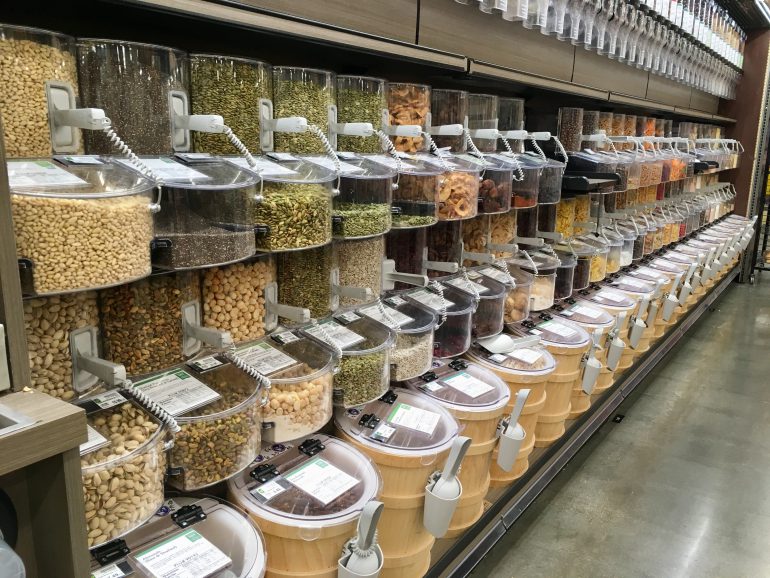This April, the Netherlands’ largest supermarket chain Albert Heijn (AH) launched its new packaging-free concept. The move is set to encourage AH customers to do a large part of their daily shopping more sustainably.
The concept is simple. Customers fill a reusable bag or jar with a choice of products, they take it home, and voila: no additional waste. The packaging-free assortment consists of seventy products and 80% is organic, the AH website explains. Customers can choose from breakfast cereals, spreads, tea and nuts, to pasta and rice.
The concept – a collaboration with SUPZero, an organisation that guides companies in the transition to waste-free concepts – was introduced to Dutch consumers at Albert Heijn XL in Rotterdam. The XL stores Gelderlandplein in Amsterdam and Leidschendam are scheduled to be next, followed by another fifty in the coming year. AH has been voted most sustainable supermarket chain in the Netherlands for the sixth year in a row in the European Sustainable Brand Index 2022, and the move aims to support AH’s ambition to use twenty million kilos less packaging material by 2025.
Marit van Egmond, CEO, says: “We encourage a healthy lifestyle and want to leave the earth a better place. We do the latter, for example, by continuously checking whether we can use less packaging material. The great thing about this concept is that customers can simply take products with them in their own reusable packaging, time after time. You can also grab exactly the amount you need. In this way, together we ensure less waste and less wastage.”
Elisah Pals, founder of Zero Waste Netherlands, added: “We have to move away from the single-use society. Separating waste at home is great, avoiding it when shopping is even better. That is a direct environmental benefit. I hope that we will soon be able to introduce packaging-free shopping in more stores.”
The concept consists of six meters of packaging-free products. Customers can fill their own reusable packaging from dispensers, or they can buy a reusable jar or bag on the spot. To help consumers get used to the new concept, packaged counterpart products elsewhere in the store have labels which state they are also available unpackaged. RTL News reported from Rotterdam that, although customers had to familiarise themselves with the new concept, there was a lot of enthusiasm. Many had brought their own packaging.
According to RTL News, some experts predict that the move may encourage consumers to pay more attention to sustainability. Dutch independent retail consultant Eelco Hos, for example, said that although packaging-free shopping may not be for the average consumer right now, “it’s a start.” Comparing it to vegetarian and organic movements, he added: “Without these kinds of initiatives you won’t get things moving.” He called the project “a super cool initiative” and argued that “Albert Heijn is showing that they mean business when it comes to reducing the amount of packaging materials”.
According to Eco & Beyond, a platform for eco-friendly solutions, the zero-packaging supermarket is a new type of retailer emerging across Europe, looking to become a global phenomenon, while Zero Waste Europe (ZWE) says there is a future for Europe’s packaging-free shops. Forbes describes that for customers climate-friendliness will become more important than brand loyalty, and that they will buy more food from packaging-free stores. It also states that bringing your own container will become the norm.
AH is not the first supermarket in the Netherlands to work with reusable product containers. In some Jumbo stores, for example, consumers can take breakfast cereals home in their own packaging, as well as at organic stores Ekoplaza, Odin and Marqt. There are also several online initiatives, such as Pieter Pot and De Groene Meisjes, and locally-owned stores in many cities. For a complete overview, check out the website of Het Zero Waste Project.
Written b y Femke van Iperen
